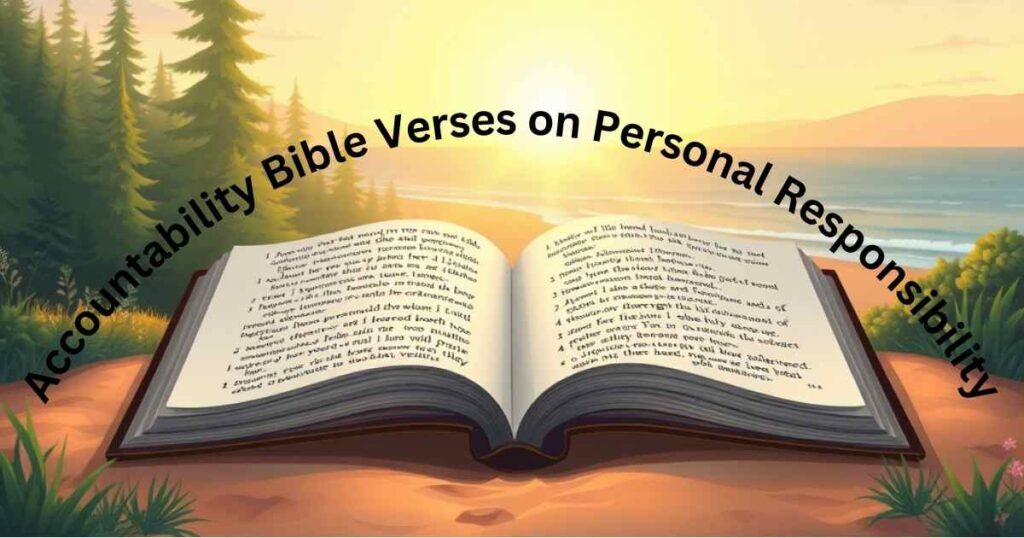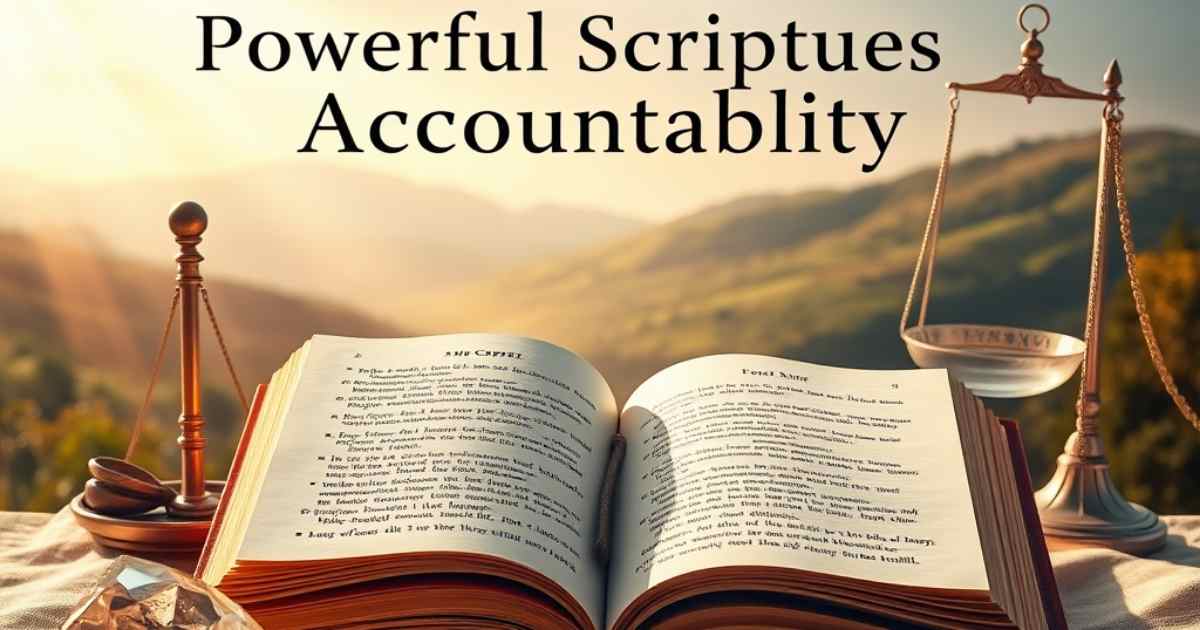Accountability is a vital part of spiritual growth, and the Bible offers powerful guidance on this topic! These Bible verses on accountability to each other remind us that God calls us to support, encourage, and hold one another responsible in love. Whether you seek strength, wisdom, or a gentle nudge toward integrity, these scriptures provide reassurance that true accountability leads to spiritual maturity and a deeper connection with God.
While the Bible may not always use the word accountability directly, it consistently teaches the importance of honesty, correction, and responsibility within the body of Christ. From Proverbs’ wisdom to Paul’s letters on Christian fellowship, God’s Word encourages us to walk in truth and hold each other up in faith. This collection of scriptures will inspire you to embrace accountability as a blessing, knowing that it strengthens relationships and deepens your walk with Christ. Let’s dive into these powerful verses and discover the wisdom they hold!
The List Of 65+ Powerful Scriptures On Accountability
Examples of Accountability in the Bible
Accountability is a key theme throughout the Bible, demonstrating how God calls His people to live with integrity and responsibility. From the Old Testament to the New, we see powerful examples of individuals being held accountable for their actions—both positively and negatively. Adam and Eve faced consequences for their disobedience, while Moses was held accountable for striking the rock instead of speaking to it as God commanded. In the New Testament, Jesus emphasized accountability through His teachings on stewardship, love, and faithfulness. The early church also upheld accountability, ensuring that believers remained strong in their faith. These biblical examples remind us that accountability is not about punishment but about spiritual growth and alignment with God’s will.
1. Genesis 3:12-13
“The man said, ‘The woman you put here with me—she gave me some fruit from the tree, and I ate it.’ Then the Lord God said to the woman, ‘What is this you have done?’ The woman said, ‘The serpent deceived me, and I ate.’”
Adam and Eve’s story is a classic example of accountability in the Bible. Instead of owning their actions, they shifted the blame. This passage teaches us the importance of taking responsibility for our choices rather than making excuses.
2. Exodus 32:25-26
“Moses saw that the people were running wild and that Aaron had let them get out of control and so become a laughingstock to their enemies. So he stood at the entrance to the camp and said, ‘Whoever is for the Lord, come to me.’ And all the Levites rallied to him.”
Moses held Aaron and the Israelites accountable when they worshiped the golden calf. This verse highlights how strong leadership requires confronting wrongdoing and calling people back to God’s truth.
3. 2 Samuel 12:7-9
“Then Nathan said to David, ‘You are the man! This is what the Lord, the God of Israel, says: I anointed you king over Israel, and I delivered you from the hand of Saul… Why did you despise the word of the Lord by doing what is evil in His eyes?’”
The prophet Nathan held King David accountable for his sin with Bathsheba. This passage teaches us that accountability often requires confrontation, but it is necessary for repentance and restoration.
4. Luke 16:10
“Whoever can be trusted with very little can also be trusted with much, and whoever is dishonest with very little will also be dishonest with much.”
Jesus emphasized accountability in stewardship, showing that how we handle small responsibilities reflects our ability to handle greater ones.
5. Galatians 2:11
“When Cephas came to Antioch, I opposed him to his face, because he stood condemned.”
Paul publicly corrected Peter when he acted hypocritically. This verse highlights the importance of holding even spiritual leaders accountable to God’s truth.
6. Acts 5:3-5
“Then Peter said, ‘Ananias, how is it that Satan has so filled your heart that you have lied to the Holy Spirit and have kept for yourself some of the money you received for the land?'”
Ananias and Sapphira were held accountable for their deceit, showing that dishonesty before God carries consequences.
7. James 3:1
“Not many of you should become teachers, my fellow believers, because you know that we who teach will be judged more strictly.”
Teachers and leaders have greater accountability because they influence others. This verse reminds us that leadership comes with serious responsibilities.
8. Hebrews 13:17
“Obey your leaders and submit to them, for they are keeping watch over your souls, as those who will have to give an account.”
Church leaders are accountable for guiding their congregations faithfully, showing that accountability is not just personal but also communal.
Age of Accountability in the Bible: What is the Age of Accountability in the Bible?
The age of accountability refers to the point at which a person becomes responsible for their sins before God. While the Bible does not explicitly mention a specific age, it teaches that young children are not held to the same standard of judgment as those who can discern right from wrong. In Jewish tradition, the age of maturity is often considered around 12 or 13, similar to Jesus at the temple at age 12. However, accountability is ultimately based on an individual’s understanding of sin and their personal relationship with God. The concept reassures believers that God’s justice is fair and compassionate, especially regarding children and those unable to comprehend sin.
1. Deuteronomy 1:39
“And the little ones that you said would be taken captive, your children who do not yet know good from bad—they will enter the land. I will give it to them, and they will take possession of it.”
This verse suggests that young children, who do not yet fully understand moral responsibility, are not held accountable in the same way as adults.
2. Isaiah 7:16
“For before the boy knows enough to reject the wrong and choose the right, the land of the two kings you dread will be laid waste.”
Isaiah acknowledges a stage in life where a child has not yet developed moral discernment, reinforcing the idea that accountability begins with understanding.
3. Matthew 19:14
“Jesus said, ‘Let the little children come to me, and do not hinder them, for the kingdom of heaven belongs to such as these.’”
Jesus’ words suggest that children are special in God’s eyes and are welcomed into His kingdom without the same accountability as adults.
4. Jonah 4:11
“And should I not have concern for the great city of Nineveh, in which there are more than a hundred and twenty thousand people who cannot tell their right hand from their left—and also many animals?”
God’s compassion for those who lack understanding, like the people of Nineveh, highlights that accountability comes with knowledge.
5. Romans 7:9
“Once I was alive apart from the law; but when the commandment came, sin sprang to life and I died.”
Paul reflects on a time before he understood sin, implying that accountability begins with awareness of God’s law.
6. 2 Samuel 12:22-23
“He answered, ‘While the child was still alive, I fasted and wept. I thought, “Who knows? The Lord may be gracious to me and let the child live.” But now that he is dead, why should I go on fasting? Can I bring him back again? I will go to him, but he will not return to me.’”
David’s words suggest his belief that his deceased infant was with God, implying a merciful view of children who die before reaching accountability.
7. Ecclesiastes 11:9
“You who are young, be happy while you are young, and let your heart give you joy in the days of your youth. Follow the ways of your heart and whatever your eyes see, but know that for all these things God will bring you into judgment.”
This verse hints that judgment applies when one matures enough to make moral choices.
8. Proverbs 20:11
“Even a child is known by his deeds, whether what he does is pure and right.”
While young children are observed for their actions, full accountability is associated with growing maturity and understanding.
Age of Accountability Bible Verses
The Bible provides insight into the idea that accountability is tied to understanding and moral awareness. While there is no single verse stating a specific age, many scriptures suggest that children are not held to the same standard as those who can comprehend right from wrong. God’s justice is always fair, and He considers each person’s level of understanding before holding them accountable for their actions. These verses emphasize that knowledge of sin brings responsibility, and accountability begins when a person becomes fully aware of their moral choices.
1. Numbers 14:29
“In this wilderness your bodies will fall—every one of you twenty years old or more who was counted in the census and who has grumbled against me.”
This verse indicates that those under 20 were not held accountable for the Israelites’ rebellion, suggesting that God may show grace to younger individuals.
2. Ezekiel 18:20
“The child will not share the guilt of the parent, nor will the parent share the guilt of the child. The righteousness of the righteous will be credited to them, and the wickedness of the wicked will be charged against them.”
This passage reinforces that accountability is personal and tied to one’s ability to understand and act upon God’s laws.
3. Romans 5:13
“To be sure, sin was in the world before the law was given, but sin is not charged against anyone’s account where there is no law.”
Paul explains that without knowledge of God’s law, accountability is not the same—pointing to the principle that awareness brings responsibility.
4. John 9:41
“Jesus said, ‘If you were blind, you would not be guilty of sin; but now that you claim you can see, your guilt remains.’”
Jesus makes it clear that understanding and accountability go hand in hand—those who are unaware of their sin are not judged the same way as those who knowingly disobey.
5. Luke 12:47-48
“The servant who knows the master’s will and does not get ready or does not do what the master wants will be beaten with many blows. But the one who does not know and does things deserving punishment will be beaten with a few blows.”
This parable teaches that judgment is based on knowledge—those who understand more are held to a higher level of accountability.
6. James 4:17
“If anyone, then, knows the good they ought to do and doesn’t do it, it is sin for them.”
Sin is directly tied to knowledge of right and wrong, supporting the idea that accountability starts when a person understands moral responsibility.
7. Acts 17:30
“In the past God overlooked such ignorance, but now He commands all people everywhere to repent.”
God’s patience with ignorance further reinforces that accountability increases with knowledge and awareness.
8. Psalm 51:5
“Surely I was sinful at birth, sinful from the time my mother conceived me.”
David acknowledges human nature but does not imply that infants are held accountable for sin before they can understand it.
Read More >>> 53+ Powerful Old Testament Scriptures For Funerals
Bible Verses About Accountability
Accountability is a key biblical principle that encourages believers to take responsibility for their actions and support one another in faith. The Bible teaches that God holds us accountable for our words, actions, and choices, urging us to live with integrity. Accountability strengthens relationships, fosters spiritual growth, and keeps us aligned with God’s will. These verses highlight the importance of being answerable to God and others, reminding us that accountability leads to wisdom and righteousness.
1. Romans 14:12
“So then, each of us will give an account of ourselves to God.”
This verse makes it clear that everyone is personally responsible for their actions before God, emphasizing individual accountability.
2. Proverbs 27:17
“As iron sharpens iron, so one person sharpens another.”
This verse speaks to mutual accountability, showing that relationships help us grow in faith and character.
3. Galatians 6:1-2
“Brothers and sisters, if someone is caught in a sin, you who live by the Spirit should restore that person gently. But watch yourselves, or you also may be tempted. Carry each other’s burdens, and in this way, you will fulfill the law of Christ.”
Here, the Bible highlights the responsibility of believers to hold each other accountable with love and care.
4. Hebrews 4:13
“Nothing in all creation is hidden from God’s sight. Everything is uncovered and laid bare before the eyes of Him to whom we must give account.”
God sees everything, reinforcing that ultimate accountability lies with Him, even when no one else is watching.
5. James 5:16
“Therefore confess your sins to each other and pray for each other so that you may be healed. The prayer of a righteous person is powerful and effective.”
This verse teaches that confession and prayer among believers foster accountability and spiritual healing.
6. Matthew 12:36-37
“But I tell you that everyone will have to give account on the day of judgment for every empty word they have spoken. For by your words you will be acquitted, and by your words you will be condemned.”
Jesus reminds us that even our words matter, reinforcing that we are responsible for everything we say.
7. Ecclesiastes 12:14
“For God will bring every deed into judgment, including every hidden thing, whether it is good or evil.”
This verse confirms that all actions—both seen and unseen—will be judged by God, emphasizing personal accountability.
8. 1 Corinthians 4:2
“Now it is required that those who have been given a trust must prove faithful.”
God expects faithfulness and integrity from those who are entrusted with responsibilities, reinforcing the principle of accountability.
Bible Verses About Accountability Partners

Having an accountability partner is a biblical principle that helps believers stay strong in faith and avoid sin. The Bible encourages us to surround ourselves with godly individuals who can support, correct, and encourage us in our spiritual journey. An accountability partner provides wisdom, prayer, and honest feedback, ensuring we stay on the right path. These verses highlight the importance of companionship in faith and the power of mutual accountability.
1. Ecclesiastes 4:9-10
“Two are better than one, because they have a good return for their labor: If either of them falls down, one can help the other up. But pity anyone who falls and has no one to help them up.”
This verse emphasizes the strength of having a partner who can support and uplift you in times of struggle.
2. Proverbs 27:6
“Wounds from a friend can be trusted, but an enemy multiplies kisses.”
True friends hold each other accountable, even when correction is difficult, because they have each other’s best interests at heart.
3. Hebrews 10:24-25
“And let us consider how we may spur one another on toward love and good deeds, not giving up meeting together, as some are in the habit of doing, but encouraging one another—and all the more as you see the Day approaching.”
Encouragement and accountability within a community help believers grow in love and righteousness.
4. Proverbs 24:26
“An honest answer is like a kiss on the lips.”
Honest accountability from a friend is valuable and should be received with gratitude.
5. Galatians 6:2
“Carry each other’s burdens, and in this way you will fulfill the law of Christ.”
True accountability means walking alongside one another in times of weakness and struggle.
6. James 5:19-20
“My brothers and sisters, if one of you should wander from the truth and someone should bring that person back, remember this: Whoever turns a sinner from the error of their way will save them from death and cover over a multitude of sins.”
This verse highlights the responsibility believers have to help each other stay on the right path.
7. 1 Thessalonians 5:11
“Therefore encourage one another and build each other up, just as in fact you are doing.”
Accountability partners should always seek to uplift and strengthen one another.
8. Proverbs 13:20
“Walk with the wise and become wise, for a companion of fools suffers harm.”
The people we surround ourselves with influence our spiritual growth, making accountability partnerships crucial for wisdom and righteousness.
Bible Verses on Accountability to Each Other
The Bible teaches that believers are not meant to walk alone but to hold each other accountable in love and truth. Being accountable to one another strengthens faith, fosters growth, and ensures that we remain obedient to God’s will. Scripture emphasizes that correction should be done with gentleness and humility, encouraging one another to live righteously. These verses highlight the importance of mutual accountability among believers.
1. Galatians 6:1-2
“Brothers and sisters, if someone is caught in a sin, you who live by the Spirit should restore that person gently. But watch yourselves, or you also may be tempted. Carry each other’s burdens, and in this way, you will fulfill the law of Christ.”
This verse emphasizes that accountability should be rooted in love and restoration, not judgment or condemnation.
2. James 5:16
“Therefore confess your sins to each other and pray for each other so that you may be healed. The prayer of a righteous person is powerful and effective.”
Confession and prayer among believers strengthen accountability and bring spiritual healing.
3. Proverbs 27:17
“As iron sharpens iron, so one person sharpens another.”
Just as iron sharpens iron, believers refine and strengthen one another through accountability and encouragement.
4. Matthew 18:15
“If your brother or sister sins, go and point out their fault, just between the two of you. If they listen to you, you have won them over.”
This verse highlights the importance of addressing issues privately and with love to restore relationships.
5. Colossians 3:16
“Let the message of Christ dwell among you richly as you teach and admonish one another with all wisdom through psalms, hymns, and songs from the Spirit, singing to God with gratitude in your hearts.”
Encouraging and correcting one another with wisdom helps believers grow in faith together.
6. 1 Thessalonians 5:14
“And we urge you, brothers and sisters, warn those who are idle and disruptive, encourage the disheartened, help the weak, and be patient with everyone.”
Accountability includes gentle correction, encouragement, and patience in helping others grow.
7. Romans 15:1
“We who are strong ought to bear with the failings of the weak and not to please ourselves.”
Strong believers have a responsibility to support and guide those who are struggling in their faith.
8. Ephesians 4:25
“Therefore each of you must put off falsehood and speak truthfully to your neighbor, for we are all members of one body.”
Honesty and truthfulness among believers strengthen accountability and unity in Christ.
Bible Verses on Accountability to God
The Bible makes it clear that ultimate accountability lies with God. He sees everything we do, hears every word we speak, and knows the intentions of our hearts. Every believer will one day stand before God and give an account of their life. This truth reminds us to live righteously, obey His commandments, and seek His guidance in all things. These verses highlight the importance of being accountable to God in our actions, words, and faith.
1. Romans 14:12
“So then, each of us will give an account of ourselves to God.”
This verse is a direct reminder that everyone is responsible for their own choices and will answer to God for them.
2. Hebrews 4:13
“Nothing in all creation is hidden from God’s sight. Everything is uncovered and laid bare before the eyes of Him to whom we must give account.”
God sees everything, meaning that nothing can be hidden from Him—our actions, thoughts, and motives are all known to Him.
3. 2 Corinthians 5:10
“For we must all appear before the judgment seat of Christ, so that each of us may receive what is due us for the things done while in the body, whether good or bad.”
This verse emphasizes that everyone will face God’s judgment and be held accountable for their deeds.
4. Ecclesiastes 12:14
“For God will bring every deed into judgment, including every hidden thing, whether it is good or evil.”
Even the things done in secret will be judged, reinforcing that God holds us accountable for every action.
5. Matthew 12:36-37
“But I tell you that everyone will have to give account on the day of judgment for every empty word they have spoken. For by your words you will be acquitted, and by your words you will be condemned.”
Our words matter just as much as our actions, and God will judge them accordingly.
6. 1 Peter 4:5
“But they will have to give account to Him who is ready to judge the living and the dead.”
No one escapes God’s judgment—every person will stand before Him and be held accountable.
7. Luke 12:48
“But the one who does not know and does things deserving punishment will be beaten with a few blows. From everyone who has been given much, much will be demanded; and from the one who has been entrusted with much, much more will be asked.”
With great blessings and responsibilities comes greater accountability before God.
8. Galatians 6:7
“Do not be deceived: God cannot be mocked. A man reaps what he sows.”
God’s justice is certain—our actions have consequences, and we are responsible for what we do.
Scriptures on Accountability to the Church
The Bible teaches that believers are accountable not only to God but also to the church community. The church serves as a place of guidance, correction, and encouragement, ensuring that members grow in faith and righteousness. Being accountable to the church helps maintain unity, strengthens spiritual discipline, and fosters an environment of love and support. These scriptures emphasize the importance of accountability within the church body.
1. Hebrews 13:17
“Have confidence in your leaders and submit to their authority, because they keep watch over you as those who must give an account. Do this so that their work will be a joy, not a burden, for that would be of no benefit to you.”
Church leaders have a responsibility to guide believers, and members should respect their leadership while remaining accountable.
2. 1 Corinthians 12:25-26
“So that there should be no division in the body, but that its parts should have equal concern for each other. If one part suffers, every part suffers with it; if one part is honored, every part rejoices with it.”
Accountability within the church means sharing both struggles and victories, ensuring unity in the body of Christ.
3. Matthew 18:17
“If they still refuse to listen, tell it to the church; and if they refuse to listen even to the church, treat them as you would a pagan or a tax collector.”
This verse highlights the importance of church discipline and accountability in correcting unrepentant members.
4. Acts 20:28
“Keep watch over yourselves and all the flock of which the Holy Spirit has made you overseers. Be shepherds of the church of God, which He bought with His own blood.”
Church leaders are entrusted with guiding and protecting the congregation, ensuring accountability within the body of Christ.
5. Galatians 6:10
“Therefore, as we have opportunity, let us do good to all people, especially to those who belong to the family of believers.”
Being accountable to the church means actively supporting fellow believers through love and good deeds.
6. 1 Timothy 5:20
“But those elders who are sinning you are to reprove before everyone, so that the others may take warning.”
This verse underscores the necessity of accountability within church leadership to maintain integrity.
7. Ephesians 4:11-12
“So Christ Himself gave the apostles, the prophets, the evangelists, the pastors and teachers, to equip His people for works of service, so that the body of Christ may be built up.”
God established leadership in the church to provide guidance, accountability, and spiritual growth for all believers.
8. James 5:14
“Is anyone among you sick? Let them call the elders of the church to pray over them and anoint them with oil in the name of the Lord.”
Accountability in the church includes seeking spiritual support and prayer from church leaders and fellow believers.
Scriptures on Accountability of Leaders
Leadership in the church comes with great responsibility, as leaders are called to guide, teach, and care for God’s people. The Bible makes it clear that leaders are held to a higher standard and will be judged more strictly. They are accountable not only for their own actions but also for how they influence others. These scriptures highlight the significance of accountability among spiritual leaders.
1. James 3:1
“Not many of you should become teachers, my fellow believers, because you know that we who teach will be judged more strictly.”
Spiritual leaders are held to a higher standard, making accountability essential in their roles.
2. 1 Timothy 3:2-3
“Now the overseer is to be above reproach, faithful to his wife, temperate, self-controlled, respectable, hospitable, able to teach, not given to drunkenness, not violent but gentle, not quarrelsome, not a lover of money.”
Church leaders must uphold high moral and ethical standards, ensuring they lead by example.
3. Titus 1:7-9
“Since an overseer manages God’s household, he must be blameless—not overbearing, not quick-tempered, not given to drunkenness, not violent, not pursuing dishonest gain. Rather, he must be hospitable, one who loves what is good, who is self-controlled, upright, holy, and disciplined.”
Accountability ensures that leaders maintain integrity and righteousness in their ministry.
4. Hebrews 13:7
“Remember your leaders, who spoke the word of God to you. Consider the outcome of their way of life and imitate their faith.”
Leaders should live in a way that reflects Christ, setting an example for others to follow.
5. 1 Peter 5:2-3
“Be shepherds of God’s flock that is under your care, watching over them—not because you must, but because you are willing, as God wants you to be; not pursuing dishonest gain, but eager to serve; not lording it over those entrusted to you, but being examples to the flock.”
True leadership is about service and responsibility, not control or personal gain.
6. Ezekiel 34:10
“This is what the Sovereign Lord says: I am against the shepherds and will hold them accountable for my flock. I will remove them from tending the flock so that the shepherds can no longer feed themselves. I will rescue my flock from their mouths, and it will no longer be food for them.”
God holds leaders accountable and will judge those who neglect or exploit His people.
7. Acts 20:26-27
“Therefore, I declare to you today that I am innocent of the blood of any of you. For I have not hesitated to proclaim to you the whole will of God.”
Leaders must faithfully teach God’s truth without compromise, remaining accountable for their message.
8. Matthew 23:11-12
“The greatest among you will be your servant. For those who exalt themselves will be humbled, and those who humble themselves will be exalted.”
True leadership is rooted in humility and servanthood, ensuring accountability before God and His people.
Accountability Bible Verses on Personal Responsibility

The Bible teaches that every individual is responsible for their own actions, choices, and faith. Personal accountability means recognizing that our decisions have consequences and that we must live according to God’s will. These verses highlight the importance of taking responsibility for our actions and striving to live a righteous life.
1. Galatians 6:5
“For each one should carry their own load.”
This verse emphasizes that while believers should support one another, each person is ultimately responsible for their own actions.
2. 2 Corinthians 5:10
“For we must all appear before the judgment seat of Christ, so that each of us may receive what is due us for the things done while in the body, whether good or bad.”
Everyone will be held accountable for their choices, reinforcing the need for personal responsibility.
3. Romans 14:12
“So then, each of us will give an account of ourselves to God.”
No one can escape personal accountability before God; we must all answer for our lives.
4. Proverbs 28:13
“Whoever conceals their sins does not prosper, but the one who confesses and renounces them finds mercy.”
Taking responsibility for our sins through confession and repentance leads to God’s forgiveness and grace.
5. Ezekiel 18:20
“The one who sins is the one who will die. The child will not share the guilt of the parent, nor will the parent share the guilt of the child. The righteousness of the righteous will be credited to them, and the wickedness of the wicked will be charged against them.”
Each person is responsible for their own actions and cannot blame others for their wrongdoing.
6. Luke 12:47-48
“The servant who knows the master’s will and does not get ready or does not do what the master wants will be beaten with many blows. But the one who does not know and does things deserving punishment will be beaten with few blows. From everyone who has been given much, much will be demanded; and from the one who has been entrusted with much, much more will be asked.”
Greater blessings and knowledge come with greater responsibility before God.
7. James 4:17
“If anyone, then, knows the good they ought to do and doesn’t do it, it is sin for them.”
Failing to act righteously when we know what is right is also a form of personal accountability.
8. Colossians 3:23-24
“Whatever you do, work at it with all your heart, as working for the Lord, not for human masters, since you know that you will receive an inheritance from the Lord as a reward. It is the Lord Christ you are serving.”
Personal responsibility includes working with integrity and dedication, knowing that our ultimate accountability is to God.
Read Also >>> 100+Powerful Call to Worship Verses Scriptures and Examples
Financial Accountability Bible Verses
The Bible teaches that money and possessions are not just for personal gain but are resources entrusted to us by God. Financial accountability means managing wealth with integrity, generosity, and wisdom. These scriptures emphasize responsible stewardship, avoiding greed, and using finances in a way that honors God.
1. Proverbs 3:9-10
“Honor the Lord with your wealth, with the firstfruits of all your crops; then your barns will be filled to overflowing, and your vats will brim over with new wine.”
This verse highlights the importance of putting God first in financial matters, ensuring that we acknowledge Him as our provider.
2. 1 Timothy 6:10
“For the love of money is the root of all kinds of evil. Some people, eager for money, have wandered from the faith and pierced themselves with many griefs.”
Money itself isn’t evil, but an unhealthy attachment to wealth can lead to spiritual downfall, making financial accountability crucial.
3. Luke 16:10-11
“Whoever can be trusted with very little can also be trusted with much, and whoever is dishonest with very little will also be dishonest with much. So if you have not been trustworthy in handling worldly wealth, who will trust you with true riches?”
God tests our faithfulness in small matters, including finances, before entrusting us with greater spiritual blessings.
4. Matthew 6:19-21
“Do not store up for yourselves treasures on earth, where moths and vermin destroy, and where thieves break in and steal. But store up for yourselves treasures in heaven, where moths and vermin do not destroy, and where thieves do not break in and steal. For where your treasure is, there your heart will be also.”
True wealth lies in eternal treasures, not earthly possessions, emphasizing the need for responsible financial management.
5. Proverbs 22:7
“The rich rule over the poor, and the borrower is a slave to the lender.”
This verse warns about the dangers of debt, encouraging wise financial decisions and accountability.
6. Malachi 3:10
“Bring the whole tithe into the storehouse, so that there may be food in my house. Test me in this,” says the Lord Almighty, “and see if I will not throw open the floodgates of heaven and pour out so much blessing that there will not be room enough to store it.”
God calls believers to be faithful in giving, promising blessings to those who practice financial obedience.
7. 2 Corinthians 9:6-7
“Remember this: Whoever sows sparingly will also reap sparingly, and whoever sows generously will also reap generously. Each of you should give what you have decided in your heart to give, not reluctantly or under compulsion, for God loves a cheerful giver.”
Giving should be done with a joyful heart, reflecting financial responsibility and trust in God’s provision.
8. Hebrews 13:5
“Keep your lives free from the love of money and be content with what you have, because God has said, ‘Never will I leave you; never will I forsake you.’”
Financial accountability includes contentment and trust in God rather than chasing material wealth.
Scriptures on Accountability in Prayer
Prayer is not just a personal conversation with God; it is also a responsibility. The Bible teaches that believers should be accountable in their prayer life—praying consistently, interceding for others, and seeking God’s will. These scriptures emphasize the importance of prayer, faithfulness, and accountability in our relationship with God.
1. 1 Thessalonians 5:16-18
“Rejoice always, pray continually, give thanks in all circumstances; for this is God’s will for you in Christ Jesus.”
Prayer is a continuous practice, not just an occasional act. Staying accountable in prayer keeps us aligned with God’s purpose.
2. Matthew 6:6
“But when you pray, go into your room, close the door and pray to your Father, who is unseen. Then your Father, who sees what is done in secret, will reward you.”
Prayer should be sincere and personal, not just for show. Being accountable means maintaining a genuine connection with God.
3. Philippians 4:6-7
“Do not be anxious about anything, but in every situation, by prayer and petition, with thanksgiving, present your requests to God. And the peace of God, which transcends all understanding, will guard your hearts and your minds in Christ Jesus.”
Prayer is a responsibility that brings peace and trust in God rather than fear or worry.
4. James 5:16
“Therefore confess your sins to each other and pray for each other so that you may be healed. The prayer of a righteous person is powerful and effective.”
Accountability in prayer also includes interceding for others and confessing sins to trusted believers for healing.
5. Colossians 4:2
“Devote yourselves to prayer, being watchful and thankful.”
This verse calls for commitment in prayer, highlighting the importance of discipline and gratitude.
6. Romans 12:12
“Be joyful in hope, patient in affliction, faithful in prayer.”
Remaining faithful in prayer, even during difficult times, is a key part of spiritual accountability.
7. Ephesians 6:18
“And pray in the Spirit on all occasions with all kinds of prayers and requests. With this in mind, be alert and always keep on praying for all the Lord’s people.”
Believers are accountable not only for their personal prayers but also for praying for others in the faith.
8. Psalm 145:18
“The Lord is near to all who call on him, to all who call on him in truth.”
God honors sincere and truthful prayers, emphasizing the need for honesty and consistency in our prayer life.
Also Read More >>> 50+ Bible Verses About Cardinal Birds
Conclusion
Accountability is a crucial part of spiritual growth, helping believers stay committed to their faith, relationships, and responsibilities. The 65+ Powerful Scriptures On Accountability remind us that God calls us to live with integrity, seek wisdom, and support one another in our spiritual journey. Whether it’s financial stewardship, prayer, leadership, or personal responsibility, the Bible provides clear guidance on holding ourselves and others accountable.
By embracing these scriptures, we develop stronger character, deepen our relationship with God, and create a community built on trust and encouragement. Living a life of accountability not only brings blessings but also ensures that we reflect Christ’s teachings in our daily actions. Let these verses inspire you to stay faithful, responsible, and committed to walking in righteousness.
FAQ’s
What does the Bible say about accountability?
The Bible teaches that accountability is essential for spiritual growth, personal responsibility, and community support. Verses like Proverbs 27:17 and Galatians 6:1-2 emphasize encouraging and correcting one another in love.
What is the age of accountability in the Bible?
The Bible does not specify an exact age, but verses like Deuteronomy 1:39 suggest that children who are too young to understand right from wrong are not held accountable in the same way as adults. Many believe it is the age when a person can understand sin and make a conscious decision about faith.
Why is financial accountability important according to the Bible?
Financial accountability is vital because God calls us to be wise stewards of our resources. Scriptures like Proverbs 3:9-10 and 2 Corinthians 9:6-7 teach that managing money responsibly and giving generously honors God and brings blessings.
How can we practice accountability in prayer?
We can practice accountability in prayer by staying committed to a consistent prayer life, interceding for others, and seeking God’s guidance. James 5:16 encourages believers to confess sins and pray for one another for healing and spiritual growth.
What is the role of accountability in leadership?
Leaders are called to a higher standard of accountability, as seen in verses like Hebrews 13:17. They are responsible for guiding others with integrity, humility, and faithfulness, knowing that God will hold them accountable for their actions and teachings.

[Gospel Guardian] is the founder of BiblePrayerVibes.com, dedicated to sharing biblical teachings, prayers, and faith-based insights. Passionate about spreading God’s word, strives to inspire and uplift believers worldwide through scripture and devotion.










